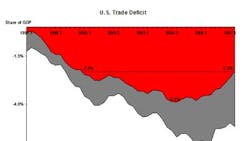Presidential candidate Bill Clinton's campaign coined the phrase "It's the economy, stupid." back in 1992. At the time, the economy was just emerging from recession and the unemployment rate was at an eight year high. The Clinton team believed that anxiety about the economy was the primary concern of voters. They focused relentlessly on it. Apparently, it resonated with the voters.
A variation on that phrase fits the economic situation today. The U.S. economy is currently going through a very deep housing downturn, and the spillover effects into other parts of the economy are intensifying. Thanks to a rising tide of exports, however, if the economy does dip into recession this year, it will likely be milder for manufacturers than the 2001 recession. An update to the Clinton political slogan today could be, "It's the global economy."
During the 2001 recession, an overvalued dollar, which makes U.S. products uncompetitive globally, and stagnant economic growth abroad, proved to be a toxic combination for American exporters. That year, U.S. exports plummeted 12% -- the biggest decline in two decades. Because manufactured products account for two-thirds of U.S. exports, this was a principal reason why the manufacturing downturn was much deeper than the general recession at the time.
The global trade environment has improved significantly for U.S. manufacturers since 2001. The high-flying dollar, after reaching a 19-year peak in relation to other currencies in 2002, has moderated by 22% and now stands basically at its 1996 level. At the same time, the global economy is much stronger today than it was in 2001. The economies of our 25 largest export markets (countries that buy 85%t of U.S. manufactured exports) edged up just 0.5% in 2001. By contrast, over the past four quarters these economies have grown a strong 3.4%. So, a once toxic combination of an overvalued dollar and weak foreign growth has turned in our favor.
| The NAM/IndustryWeek Manufacturing Index |
While this decline is noteworthy, it masks an even greater improvement. Because our economy relies heavily on imported oil, the rising cost of a barrel of oil has made petroleum a major component of the trade deficit. In fact, petroleum imports alone accounted for a majority (55%) of the entire U.S. trade deficit in the fourth quarter of last year. Outside of petroleum imports, the U.S. trade deficit has already narrowed by 40% over the past three years and now, at 2.3% of GDP, stands at its lowest level since 1999 (see chart).
Thus, while differences in exchange rates and economic growth rates play a significant role in determining the U.S. trade deficit, Congress has the power to push current trends further in our favor. Three free trade agreements awaiting action by Congress will eliminate most tariffs on U.S. manufactured goods exports to Colombia, Panama and South Korea. Congress should pass these agreements this year. Lowering trade barriers overseas will enhance domestic manufacturers' competitiveness, increase domestic production for export and create more well-paying jobs for American workers.
The U.S. economy is a complex engine. There are times, like today, when all cylinders are not firing. That is why it is critically important for public policy to focus on improving the long-term competitiveness of our economy. Lowering foreign tariff barriers on American-made goods will do just that. The more American manufacturers can sell to the 73% of the world economy outside our borders, the better our county will be able to withstand periodic troubles in the domestic economy, as the current situation clearly demonstrates.
